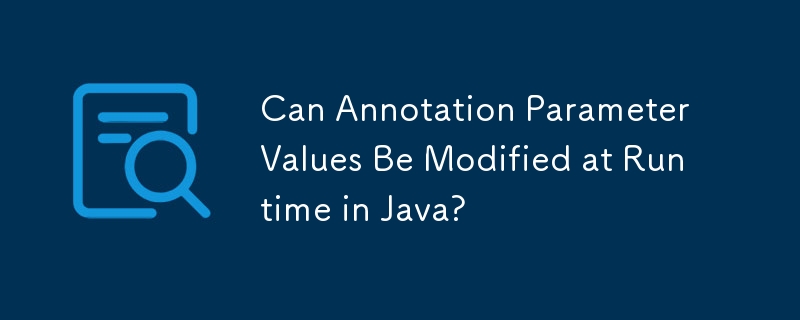

Annotationsparameterwerte zur Laufzeit ändern
Stellen Sie sich vor, Sie stoßen auf eine Klasse mit einer Annotation, die mit einem bestimmten Parameterwert dekoriert ist, und Sie möchten diesen ändern Wert zur Laufzeit. Ist es möglich, einen Annotationsparameterwert in einer kompilierten Klasse zu ändern, die bereits in die JVM geladen ist?
Lösung:
Ja, es ist möglich, Annotationsparameter zu ändern Werte zur Laufzeit. Der folgende Ansatz kann verwendet werden:
@SuppressWarnings("unchecked")
public static Object changeAnnotationValue(Annotation annotation, String key, Object newValue) {
Object handler = Proxy.getInvocationHandler(annotation);
Field f;
try {
f = handler.getClass().getDeclaredField("memberValues");
} catch (NoSuchFieldException | SecurityException e) {
throw new IllegalStateException(e);
}
f.setAccessible(true);
Map<String, Object> memberValues;
try {
memberValues = (Map<String, Object>) f.get(handler);
} catch (IllegalArgumentException | IllegalAccessException e) {
throw new IllegalStateException(e);
}
Object oldValue = memberValues.get(key);
if (oldValue == null || oldValue.getClass() != newValue.getClass()) {
throw new IllegalArgumentException();
}
memberValues.put(key, newValue);
return oldValue;
}Verwendung:
@Retention(RetentionPolicy.RUNTIME)
@Target(ElementType.TYPE)
public @interface ClassAnnotation {
String value() default "";
}
@Retention(RetentionPolicy.RUNTIME)
@Target(ElementType.FIELD)
public @interface FieldAnnotation {
String value() default "";
}
@Retention(RetentionPolicy.RUNTIME)
@Target(ElementType.METHOD)
public @interface MethodAnnotation {
String value() default "";
}
@ClassAnnotation("class test")
public static class TestClass {
@FieldAnnotation("field test")
public Object field;
@MethodAnnotation("method test")
public void method() {}
}
public static void main(String[] args) throws Exception {
final ClassAnnotation classAnnotation = TestClass.class.getAnnotation(ClassAnnotation.class);
System.out.println("old ClassAnnotation = " + classAnnotation.value());
changeAnnotationValue(classAnnotation, "value", "another class annotation value");
System.out.println("modified ClassAnnotation = " + classAnnotation.value());
Field field = TestClass.class.getField("field");
final FieldAnnotation fieldAnnotation = field.getAnnotation(FieldAnnotation.class);
System.out.println("old FieldAnnotation = " + fieldAnnotation.value());
changeAnnotationValue(fieldAnnotation, "value", "another field annotation value");
System.out.println("modified FieldAnnotation = " + fieldAnnotation.value());
Method method = TestClass.class.getMethod("method");
final MethodAnnotation methodAnnotation = method.getAnnotation(MethodAnnotation.class);
System.out.println("old MethodAnnotation = " + methodAnnotation.value());
changeAnnotationValue(methodAnnotation, "value", "another method annotation value");
System.out.println("modified MethodAnnotation = " + methodAnnotation.value());
}Dieser Ansatz funktioniert durch direktes Modifizieren der internen Darstellung der Anmerkung. Infolgedessen rufen nachfolgende Reflexionsaufrufe den geänderten Parameterwert ab. Dies hat den Vorteil, dass keine neue Annotationsinstanz erstellt werden muss, sodass keine Vorkenntnisse über die spezifische Annotationsklasse erforderlich sind. Darüber hinaus werden Nebenwirkungen minimiert, indem die ursprüngliche Annotationsinstanz unberührt bleibt.
Das obige ist der detaillierte Inhalt vonKönnen Anmerkungsparameterwerte zur Laufzeit in Java geändert werden?. Für weitere Informationen folgen Sie bitte anderen verwandten Artikeln auf der PHP chinesischen Website!




